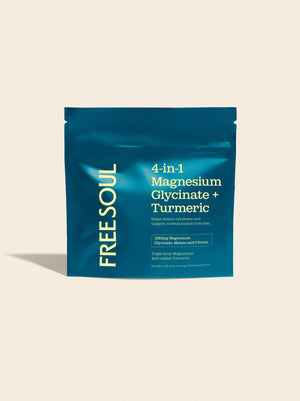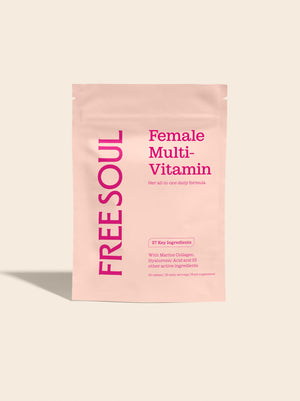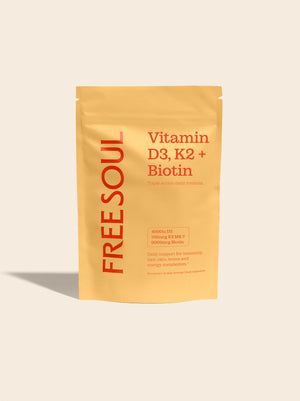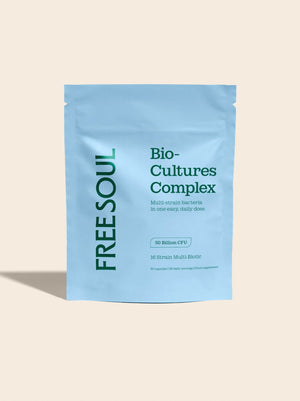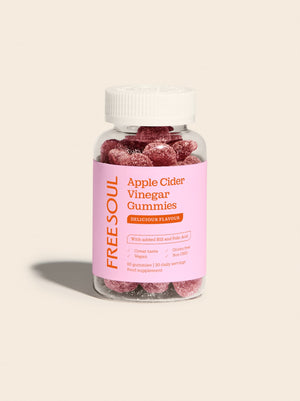Mood swings, breakouts, brain fog… most women are all too familiar with the signs that hormones are doing their thing. But their impact runs deeper than monthly symptoms. These chemical messengers regulate nearly every system in the body, from mood and fertility to sleep and metabolism.
And it's a delicate balance. When one falls out of range, it can send a ripple effect through the whole system.
“There are a lot of factors at play, such as sleep, stress, and movement,” says Natalie Rouse, Registered Nutritionist (RNutr) and Head of Nutrition at Free Soul. “But one that is often overlooked is nutrition, and the importance of protein for hormone balance in particular”.
We’re taking a deep dive into the role protein plays in the complex hormonal balance in women's bodies, and why it matters through every life stage.
The link between Protein and Hormones
Protein plays a direct role in hormone production, especially peptide hormones, the ones made from amino acids. These include:
- Leptin – Regulates fullness
- Oxytocin – Supports social bonding and mood
- Insulin – Helps manage blood sugar
- Growth hormone – Involved in cell repair and muscle maintenance
Amino acids are the building blocks of Protein. There are nine essential amino acids we must get from our diets, and eleven non-essential ones that our bodies can make, as long as we’re eating a varied and balanced diet. Different protein sources contain different combinations and amounts of these amino acids, which is why variety is so important.
When you eat protein, your body breaks it down into its amino acids, the raw materials used to build and regulate these hormones.
Protein supports the enzymes that regulate hormones
Hormones need enzymes in order to be activated, metabolised, and then broken down once they’ve done their job. Enzymes themselves are made from protein, so getting enough ensures your body has what it needs to keep hormonal processes running smoothly.
Protein helps regulate appetite
Not just in the basic sense that eating = less hungry. It’s the most filling macronutrient found within your food, increasing the release of leptin (your “I’m full” hormone) and decreasing ghrelin (your “I’m hungry” hormone), which can help reduce cravings, keep your appetite balanced and help naturally amplify the bodies GLP-1 response.
Protein contributes to blood sugar stabilisation
Because it digests more slowly than carbohydrates, protein can help prevent sharp blood sugar spikes. This supports more stable levels of insulin and cortisol, two hormones that influence energy, mood, and stress.
Protein feeds neurotransmitters linked to hormone health
Some amino acids also contribute to the production of neurotransmitters, like dopamine and serotonin, which interact with hormone pathways. They can influence mood, sleep, focus, and your stress response – all of which are impacted by hormone fluctuations.
Is Protein good for hormonal imbalance?
Protein’s role in hormone production and regulation makes it essential for keeping everything in balance, especially for women going through hormonal shifts like PMS, perimenopause, or high stress.
“Without adequate protein, your body doesn’t have the amino acids it needs to keep the systems that manage mood, growth, reproduction, and metabolism running properly,” says Natalie.
So, is protein good for hormonal imbalance? Absolutely. Here’s why:
- Hormone synthesis – Peptide hormones like insulin, oxytocin, and follicle-stimulating hormone (FSH) are made from amino acids. Without enough protein, your body can’t produce them efficiently.
- Thyroid hormone production – Amino acids, such as tyrosine, are needed to create thyroid hormones, which regulate mood, metabolism, and energy.
- Stress hormone support – Protein supports the HPA axis (your stress response system), which helps regulate cortisol.
- Hormone signalling – Adequate protein may support more effective hormone signalling, particularly for hormones like insulin that influence menstrual regularity and metabolism.
- Provides hormone supporting nutrients – Many protein-rich foods also contain other nutrients important for hormone health, including magnesium, zinc, selenium, and B vitamins.
“Making sure you’re getting enough protein, especially during hormonally intense times like PMS or perimenopause, can really make a difference to how you feel day to day, including your mood, energy, and the symptoms that come with hormone changes,” says Natalie.
How much Protein do women need for hormone support?
The recommended daily intake for women is 0.75g per kilo of bodyweight, which works out at around 45g per day. However, this is just the baseline. During certain stages of the menstrual cycle, pregnancy, and from perimenopause onwards, Protein needs can increase.
Here’s when you might benefit from more:
- PMS and menstrual cycle – At this time, you may be more prone to fatigue, and your appetite and blood sugar may be affected. Upping your protein intake may help stabilise mood and support steady energy.
- Pregnancy and breastfeeding – Protein needs rise to support both your body and the baby’s development.
-
Perimenopause and menopause – As muscle mass naturally begins to decline, prioritising protein can help preserve strength, energy, and metabolic health.
“During these times, you can support your body by increasing protein intake to around 1-1.2g of protein per kilo of bodyweight. If you feel like you’re not getting enough, speak to your GP or a nutrition professional.”
Tips to add more Protein to your day
Eating enough protein can sometimes be a challenge, especially if you’re busy and don’t fancy chicken with every meal. Here are a few ways to make sure you get enough:
- Add a source of protein to every meal – Many people try to pack their intake in at dinner, but it's better to spread it out between breakfast and lunch too.
- Try protein-rich snacks – Swap the crisps for cottage cheese, Greek yoghurt, nuts, seeds, or hard-boiled eggs
- Layer up your meals – Top soups, salads, and bowls with extras like tofu, tempeh, a fried egg, or leftover chicken.
-
Use supplements wisely – A protein shake or blend is a simple way to hit your daily intake goal, especially on hectic days.
“It’s important to consume a diverse range of protein sources so you get the full spectrum of the nine essential amino acids,” says Natalie. “Ensure you include a mix of plant and/or animal-based options, and check that any protein supplements you use are made of high-quality protein”.
Protein for Hormone Balance FAQs
What type of protein is best for hormone balance?
There’s no single type of protein that’s best for hormone balance. The most important thing is to make sure you’re getting all the essential amino acids, whether from animal sources or a mix of plant-based ones, to give your body what it needs for hormone production and regulation.
Can lack of protein cause hormonal imbalance?
Yes. Your body uses amino acids from protein to create and regulate hormones. If you’re not getting enough, this process may be disrupted. Protein deficiency is rare in the UK. However, we see many people lacking variety and removing or limiting food groups, which leads to amino acid gaps.
Can too much protein affect hormones?
Some studies suggest that extremely high protein diets may influence hormones like testosterone and cortisol, although the typical diet doesn’t reach those levels. Overall, too much of anything is never good, and it’s best to keep within the recommended protein intake ranges.
How does protein help with PMS or menopause symptoms?
Protein may help regulate blood sugar, which can reduce mood swings, fatigue, and cravings during hormonal shifts. It also supports muscle and bone health, which is especially important during menopause. Also, eating more protein throughout the day can help you feel fuller for longer, reducing the likelihood you’ll reach for sugary foods when your energy dips.
Is plant-based protein effective for hormone health?
Yes, plant-based protein can be just as effective, as long as you’re getting a complete amino acid profile. Use a variety of sources or choose blends designed to provide all essential amino acids.



